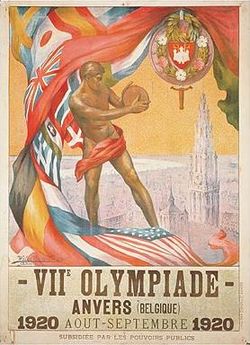1920 Summer Olympics
| Games of the VII Olympiad | |
|---|---|
 |
|
| Host city | Antwerp, Belgium |
| Nations participating | 29 |
| Athletes participating | 2,626 (2,561 men, 65 women) |
| Events | 154 in 22 sports |
| Opening ceremony | April 20 |
| Closing ceremony | September 12 |
| Officially opened by | Albert I of Belgium |
| Athlete's Oath | Victor Boin |
| Stadium | Olympisch Stadion |
The 1920 Summer Olympics, officially known as the Games of the VII Olympiad, were an international multi-sport event which was celebrated in 1920 in Antwerp, Belgium. The 1920 Games were awarded to Antwerp to honor the people of that city after the suffering they endured during World War I.[1][2] The initial choice for the site of the Games had been Budapest, Hungary. Though the majority of events took place in Belgium, there was a single sailing event which took place in Dutch waters and as such, the games were officially in both countries.
The 1916 Summer Olympics, to be held in Berlin, capital of the German Empire, were canceled due to the war. The aftermath of the war and the Paris Peace Conference, 1919 affected the Olympic Games not only due to new states being created, but also by sanctions against the nations that lost the war and were blamed for starting it.
Budapest had initially been selected to host the Games over Amsterdam and Lyon, but as the Austro-Hungarian Empire had been a German ally in the First World War, the Games were transferred to Antwerp in April 1919. Hungary, Germany, Austria, Bulgaria and Turkey were also banned from competing in the Games. Germany remained banned until 1925, and instead hosted a series of games called Deutsche Kampfspiele, starting with the Winter edition of 1922 (which predated the first Winter Olympics).
Contents |
Highlights
- These Olympics were the first in which the Olympic Oath was voiced, the first in which doves were released to symbolize peace, and the first in which the Olympic Flag was flown.
- The USA won 41 Gold, 27 Silver, and 27 Bronze medals, the most won by any of the 29 nations attending. Sweden, Great Britain, Finland and Belgium rounded out the five most successful medal-winning nations.
- The Games also featured a week of winter sports, with figure skating and ice hockey making their Olympic debut.
- Duke Kahanamoku retained the 100 m swimming title he won before the war.
- Nedo Nadi won 5 gold medals in the fencing events.
- At the age of 72, Sweden's 100 metre running deer double-shot event champion Oscar Swahn won in the team event to become the oldest Olympic champion ever.
- 23-year-old Paavo Nurmi won the 10,000 m and 8,000 m cross country races, took another gold in team cross country, and a silver in 5,000 m run. His contributions for Finland broke the U.S. dominance record in track and field with 9 medals.
- In a unique moment in Olympic history, the 12-foot dinghy event in sailing was held in two different countries. The final two races in the event were held in the Netherlands, as the only two competitors in the event were Dutch.[1]
- Sport shooter Guilherme Paraense won Brazil's first ever Gold Medal at the Olympic Games.
Medals awarded
|
|
Demonstration sport
Participating nations
A total of 29 nations participated in the Antwerp Games, only one more than in 1912, as Germany, Austria, Hungary, Bulgaria and Turkey were not invited, having lost World War I. From the newly created European states, only Estonia took part, and Czechoslovakia, succeeding Bohemia which had sent athletes prior to World War I as part of the Austrian Empire. Poland was busy with the Polish-Soviet War and therefore was unable to form an Olympic team. Argentina, Finland, Yugoslavia, Brazil, Monaco competed as nations at the Olympic Games for the first time. New Zealand, which had competed as part of a combined team with Australia in 1908 and 1912, competed on its own for the first time.
|
|
|
As the local Olympic Organizing Committee went bankrupt during the Antwerp 1920 Games, no official report of the Games was ever produced. The documents of the Games were archived at the Belgium Olympic Committee headquarters in Brussels. [3] Official name of Yugoslavia was the Kingdom of Serbs, Croats and Slovenes before 1929.
Medal count
These are the top ten nations that won medals at the 1920 Games.
| Rank | Nation | Gold | Silver | Bronze | Total |
|---|---|---|---|---|---|
| 1 | 41 | 27 | 27 | 95 | |
| 2 | 19 | 20 | 25 | 64 | |
| 3 | 15 | 15 | 13 | 43 | |
| 4 | 15 | 10 | 9 | 34 | |
| 5 | 14 | 11 | 11 | 36 | |
| 6 | 13 | 9 | 9 | 31 | |
| 7 | 13 | 5 | 5 | 23 | |
| 8 | 9 | 19 | 13 | 41 | |
| 9 | 4 | 2 | 5 | 11 | |
| 10 | 3 | 9 | 1 | 13 |
See Also
Notes
- ↑ 1.0 1.1 "Antwerp 1920". Olympic.org. International Olympic Committee. http://www.olympic.org/en/content/Olympic-Games/All-Past-Olympic-Games/Summer/Antwerp-1920.
- ↑ http://www.flanderstoday.eu/jahia/Jahia/pid/2223
- ↑ http://www.la84foundation.org/6oic/OfficialReports/1920/1920.pdf
References
- "Antwerp 1920". Olympic.org. International Olympic Committee. http://www.olympic.org/en/content/Olympic-Games/All-Past-Olympic-Games/Summer/Antwerp-1920.
- "All the Medallists since 1896". Olympic.org. International Olympic Committee. http://www.olympic.org/en/content/All-Olympic-results-since-1896/?AthleteName=&Games=1333752&Country=&Sport=&TargetResults=true&resultsPageIPP=30.
External links
- "Antwerp 1920". Olympic.org. International Olympic Committee. http://www.olympic.org/en/content/Olympic-Games/All-Past-Olympic-Games/Summer/Antwerp-1920.
- Flanders Today article on the 1920 Antwerp Olympics
| Preceded by Berlin (abandoned) |
Summer Olympic Games Antwerp VII Olympiad (1920) |
Succeeded by Paris |
|
||||||||||||||
|
|||||